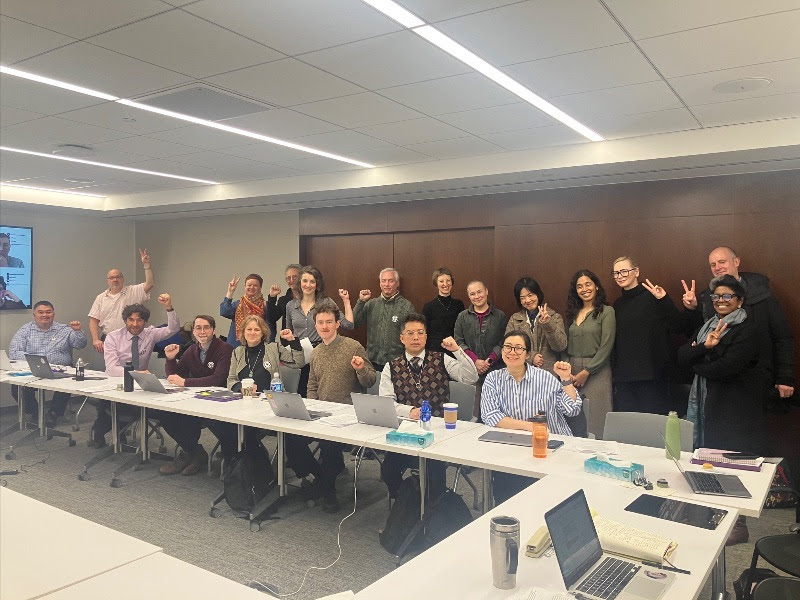Since the start of fall semester, NYU administrators have been asking the university community to trust them and to “rest assured” that they’re working tirelessly behind the scenes. At the bargaining table, we’ve invited them to treat our contract negotiations as an opportunity to reaffirm the values they claim to defend but are no longer willing to name publicly.
Our seventh bargaining session was four hours long and productive in several ways. However, rather than come closer to agreements on key issues like international faculty rights, a respectful work environment, health and safety, or privacy, the administration’s negotiators gave us proposals that would defer our legitimate concerns to committees, leave faculty unprotected, and erode existing job protections. The tone of our conversation was civil, but it was clear that we will all need to keep working to show the NYU administration why these issues matter to us and why we need to win the strong first contract we deserve.
Read all the proposals and counterproposals on the Bargaining Tracker.
The Good
The administration has agreed to a three-step grievance process to enforce violations of our contract, and we are coming closer to agreement on the timeline and deadlines for that process. Likewise, the administration has previously agreed that contract faculty can only be disciplined or dismissed for just cause — an important legal protection — but we are still fighting for basic due process rights.
Their response to a section of our union rights and access proposal on bargaining unit information brought us closer to agreement on a technical but important topic that will make it easier for our union to communicate with members and track possible discrimination. The administration also continues to make slow progress locating the information that they are legally required to provide.
The Bad
The rest of their proposals ranged from “disappointing” to “insulting.” In their counterproposal to our comprehensive article guaranteeing a respectful work environment, they reserved the right to discriminate on the grounds of transition status, caste, political opinion, and a number of others. They rejected outright our proposal to ban abusive conduct unrelated to protected classes, as well as a provision that would have insulated anti-discrimination policies from the vicissitudes of changing law.
For safety and health, data privacy, and artificial intelligence, the administration had a one-size-fits-all solution. Where we demanded specific protections on ergonomics, vaccine policies, and workplace violence, they suggested a committee. Where we proposed that the administration commit to best practices of data security and not attempt to replace us with AI, they again suggested a committee. We know better, and will continue to demand better.
The Ugly
Finally, the administration made two proposals that were, to be frank, insulting.
First, they proposed a year-long “probationary period” in which no workplace protections would apply, effectively undermining our current multi-year minimums and leaving us vulnerable to retaliation, abuse, and decanal caprice. We consider their proposal to be a non-starter.
More troubling, the administration offered us a trade: if we give up proposed safety and privacy protections, they will agree to enshrine in our contract current NYU policy not to voluntarily aid in the detention and deportation of our non-citizen colleagues and students. It was a transparent attempt to play our concern for the most vulnerable members of our community against our demands for basic protections against repetitive stress injuries and identity theft. Obviously, we aren’t falling for that.
Defending Academic Freedom
We proposed two crucial new articles to defend our professional integrity and academic freedom. Our intellectual property article would ensure that the university can’t steal our course materials and give them to someone else or license our syllabi and lecture notes to another university or for-profit company.
We also made a major proposal on appointment, reappointment, and promotion. Our proposal provides for differences across schools and departments, allowing each school, program, or department, through its own faculty governance systems, to set its own standards. While protecting that diversity, our proposal establishes basic guidelines of fairness, which we pulled from the C-FSC’s 25 Principles for School Policies on Appointment, Reappointment, and Promotion. Finally, it includes an important innovation that will safeguard the academic freedom of we contract faculty, who make up half of NYU’s full-time professors: presumptively renewable appointments for faculty who have been reviewed multiple times. In other words, we seek to safeguard our academic freedom and our job security by guaranteeing that after multiple reviews contract faculty members may be non-reappointed only for just cause.
The protections of presumptively renewable appointments would be a major improvement, not only for contract faculty but for our students and indeed the entire university: a stable and secure faculty with the right to teach according to our expertise. Just as the administration is reluctant to stand up against the winds from Washington, so too will they be reluctant to give us the job security and academic freedom we deserve. To win it will take everyone. Get involved. Come observe a bargaining session. Share your story. Together, we have a university to win.

In-person observers joined our session to tell the NYU administration why academic freedom matters to contract faculty!
In Solidarity,
Contract Faculty United – UAW Bargaining Committee
Richard Dorritie (Rory Meyers College of Nursing)
Elisabeth Fay (Expository Writing Program, Arts & Science)
Robin Harvey (Teaching and Learning, Steinhardt)
Thomas Hill (Center for Global Affairs, SPS)
Peter Li (General Engineering, Tandon)
Benedetta Piantella (Technology, Culture, and Society, Tandon)
Jacob Remes (Gallatin School of Individualized Study)
Chris Chan Roberson (Undergraduate Film & TV, Tisch)
Jamie Root (French Literature, Thought and Culture, Arts & Science)
Fanny Shum (Mathematics, Courant Institute)
Heidi White (Liberal Studies)
